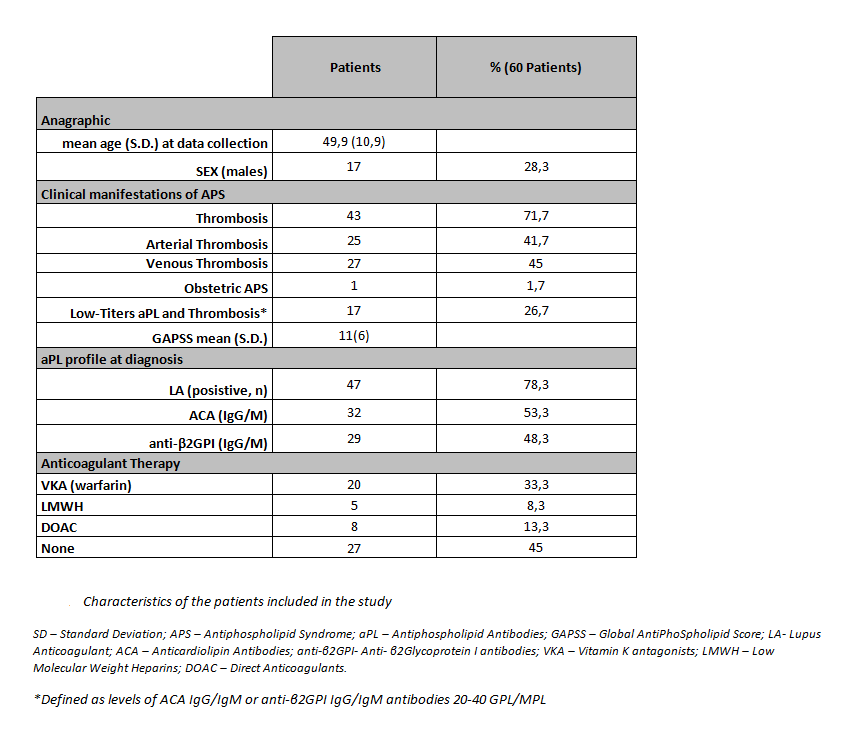Session Information
Date: Sunday, October 21, 2018
Session Type: ACR Poster Session A
Session Time: 9:00AM-11:00AM
Background/Purpose:
Correct interpretation of lupus anticoagulant (LA) tests is crucial for diagnosis of antiphospholipid syndrome (APS). However, testing patients during vitamin K antagonist (VKA) or other anticoagulant treatment remains a contentious issue and has been discouraged by official guidelines because of interpretational problems affecting the mixing test.
Methods:
We enrolled 60 patients who met one of the following inclusion criteria: 1) Fulfilled the diagnosis of thrombotic APS defined as per Sidney criteria; 2) Patients with thrombosis and suspected APS not completely fulfilling the laboratory criteria, as follows: a) and inconstant previous LA positivity; and/or b) low-medium titers aPL (defined as levels of aCL IgG/IgM or anti-β2GPI IgG/IgM 10-30 GPL/MPL aPL) with no LA positivity. aPL testing was performed in a blind fashion in 4 centers undergoing periodic external quality assessment.
Results:
The mean age at was 50 years old (SD ±11) (F:M 71,7% : 28,3%). Forty-three patients (72%) had a confirmed diagnosis of thrombotic APS (arterial 58%; venous 56%), and 17 patients presented with thrombosis and inconstant LA positivity (N. 7; 41%) and/or with low-medium titers (N. 10;59%). Categorical agreement for LA among the centers, as expressed by Cohen’s kappa coefficients, ranged between 0.41 and 0.60 (corresponding to moderate agreement). The correlation among quantitative results at the 4 sites for aPS/PT IgG was strong (Cohen’s kappa coefficients=0.81–1. Spearman rho 0.84). We observed 27 (45 % of the total) cases (15/20, 75% patients on VKA) in which LA results were discordant (as defined by lack of agreement in ≥3 laboratories) or inconclusive. Conversely, in those cases, we observed a good correlation for aPS/PT IgG testing (Cohen’s kappa coefficients=0.81–1, Spearman rho 0.86). aPS/PT testing showed an overall agreement of 83% (up to 90% in patients receiving VKA), providing an overall increase in test reproducibility of + 28% when compared to LA, becoming even more evident (+65%) when analyzing patients on VKA.
Conclusion:
Despite the progress in the standardization of aPL testing, we observed up to 45% of discrepant results for LA, even higher in patients on VKA. Our findings highlight that some discordances in the reliability of LA testing still exist. The introduction of aPS/PT antibody testing into the diagnostic process of APS might represent a further diagnostic tool, especially when LA is not available or the results are uncertain.
To cite this abstract in AMA style:
Radin M, Cecchi I, Rubini E, Scotta A, Rolla R, Montaruli B, Pergolini P, Mengozzi G, Muccini E, Vaccarino A, Roccatello D, Sciascia S. Reliability of Lupus Anticoagulant and Anti-Phosphatidylserine/Prothrombin Autoantibodies in Antiphosphospholipid Syndrome: A Multicenter Study [abstract]. Arthritis Rheumatol. 2018; 70 (suppl 9). https://acrabstracts.org/abstract/reliability-of-lupus-anticoagulant-and-anti-phosphatidylserine-prothrombin-autoantibodies-in-antiphosphospholipid-syndrome-a-multicenter-study/. Accessed .« Back to 2018 ACR/ARHP Annual Meeting
ACR Meeting Abstracts - https://acrabstracts.org/abstract/reliability-of-lupus-anticoagulant-and-anti-phosphatidylserine-prothrombin-autoantibodies-in-antiphosphospholipid-syndrome-a-multicenter-study/

